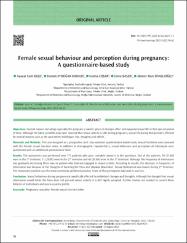| dc.contributor.author | Keçe, Ayavar Cem | |
| dc.contributor.author | Aydoğan Kırmızı, Demet | |
| dc.contributor.author | Coşar, Fatma | |
| dc.contributor.author | Başer, Emre | |
| dc.contributor.author | Sivaslıoğlu, Ahmet Akın | |
| dc.date.accessioned | 2023-09-19T12:54:48Z | |
| dc.date.available | 2023-09-19T12:54:48Z | |
| dc.date.issued | 2023 | en_US |
| dc.identifier.citation | Keçe AC, Aydoğan Kırmızı D, Coşar F, Başer E, Sivaslıoğlu AA. Female sexual behaviour and perception during pregnancy: A questionnaire- based study. Pelviperineology 2023;42(2):56-62. | en_US |
| dc.identifier.issn | 19734905 | |
| dc.identifier.uri | https://hdl.handle.net/20.500.12809/10972 | |
| dc.description.abstract | Objectives: Several reasons including especially the pregnancy-specific physical changes affect and suspend sexual life in that special period of time. Although the latest scientific data have revealed that sexual activity is safe during pregnancy sexual life during that period is affected by several reasons such as the area where individuals live, thoughts and beliefs. Materials and Methods: This was designed as a prospective and cross-sectional questionnaire-based study. Sexual functions were assessed with the female sexual function index. In addition to demographic characteristics, sexual behaviour and perception of individuals were questioned with an additional questionnaire form. Results: The assessment was performed over 171 patients who gave complete answers to the questions. Out of the patients, 54 (31.6%) were in the 1st trimester, 51 (29.8%) were in the 2nd trimester and 66 (38.6%) were in the 3rd trimester. Although the frequency of intercourse was gradually decreasing there was no patient who had not engaged in sexual activity. According to results, the decrease in frequency of intercourse was because of the thoughts of harming the fetus and physical discomfort. Sexual dysfunction was lowest during 2nd trimester. The missionary position was the most commonly preferred position. None of the participants had oral or anal sex. Conclusion: Sexual behaviour during pregnancy is specifically affected by individual changes and thoughts. Although the thought that sexual intercourse would harm the fetus does not prevent sexual activity it is still highly accepted. Further studies are needed to correct these fallacies of individuals and assess country profile. | en_US |
| dc.item-language.iso | eng | en_US |
| dc.publisher | Galenos Publishing House | en_US |
| dc.relation.isversionof | 10.34057/PPj.2023.42.02.2023-7-3 | en_US |
| dc.item-rights | info:eu-repo/semantics/openAccess | en_US |
| dc.subject | Pregnancy | en_US |
| dc.subject | Sexuality | en_US |
| dc.subject | Female sexual function index | en_US |
| dc.title | Female sexual behaviour and perception during pregnancy: A questionnaire-based study | en_US |
| dc.item-type | article | en_US |
| dc.contributor.department | MÜ, Tıp Fakültesi, Cerrahi Tıp Bilimleri Bölümü | en_US |
| dc.contributor.authorID | 0000-0003-3711-0118 | en_US |
| dc.contributor.institutionauthor | Sivaslıoğlu, Ahmet Akın | |
| dc.identifier.volume | 42 | en_US |
| dc.identifier.issue | 2 | en_US |
| dc.identifier.startpage | 56 | en_US |
| dc.identifier.endpage | 62 | en_US |
| dc.relation.journal | Pelviperineology | en_US |
| dc.relation.publicationcategory | Makale - Uluslararası Hakemli Dergi - Kurum Öğretim Elemanı | en_US |


















